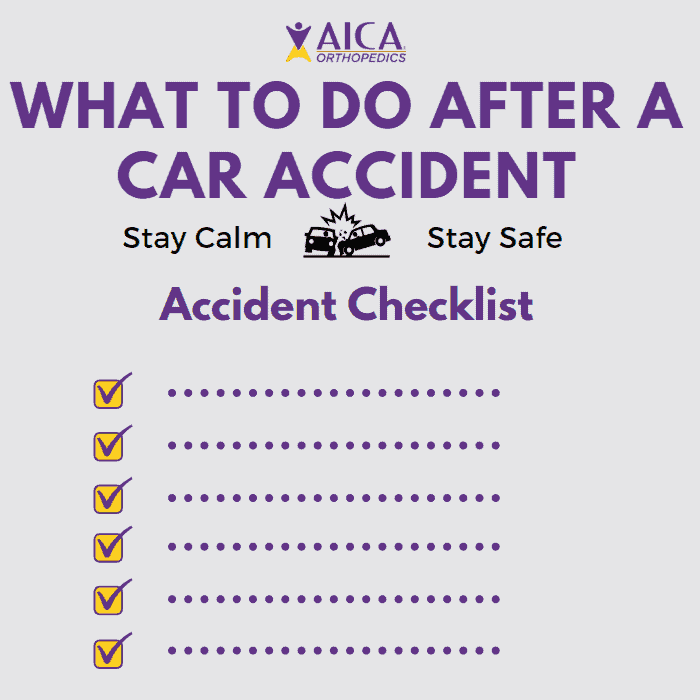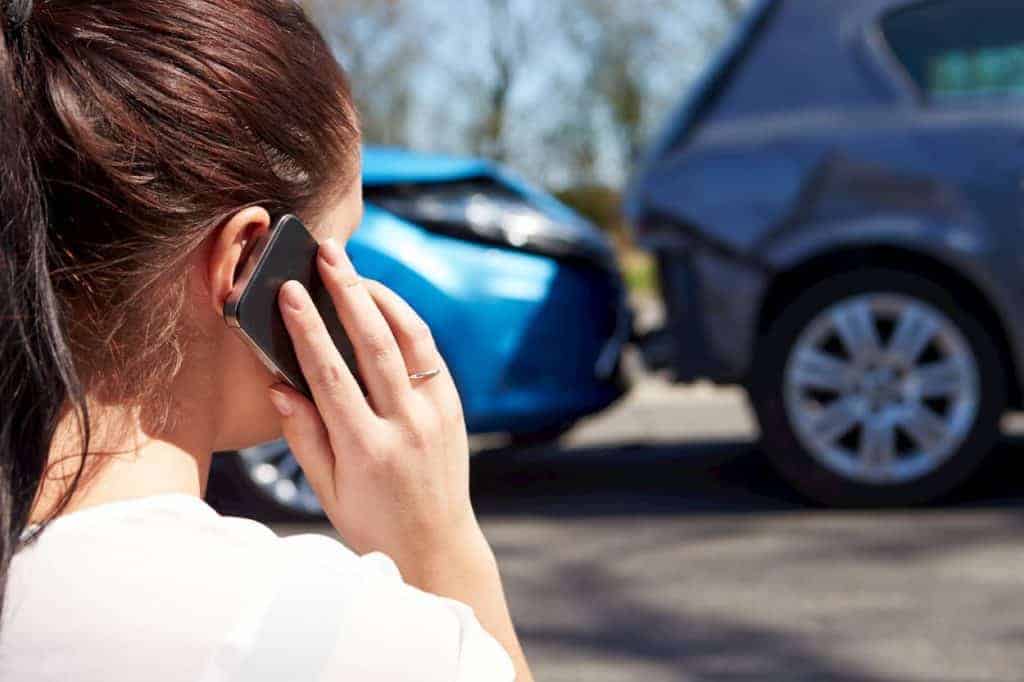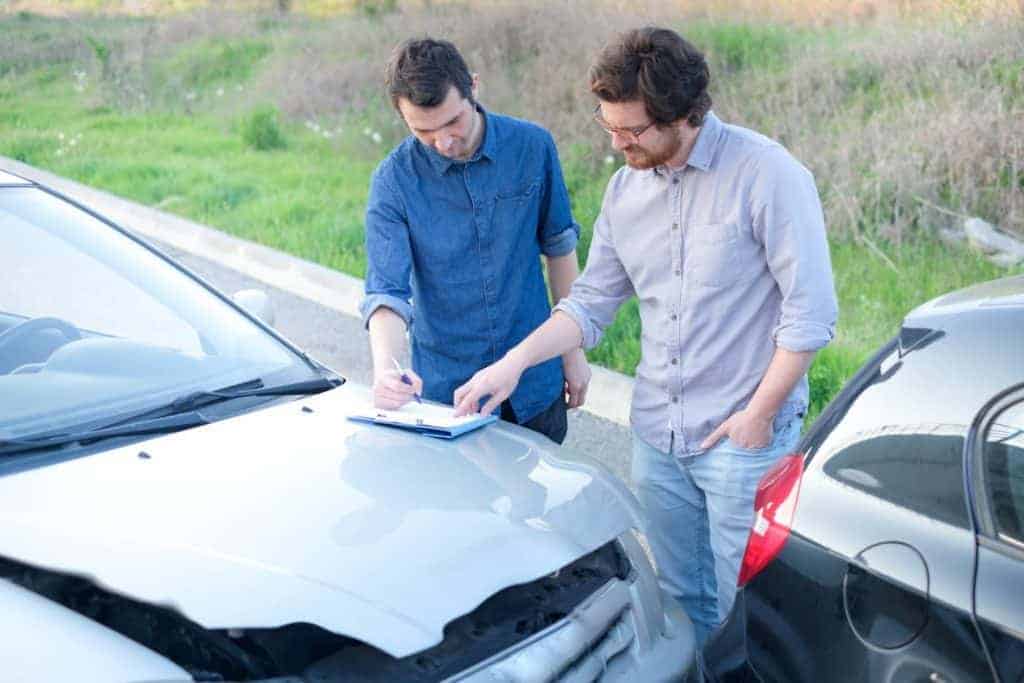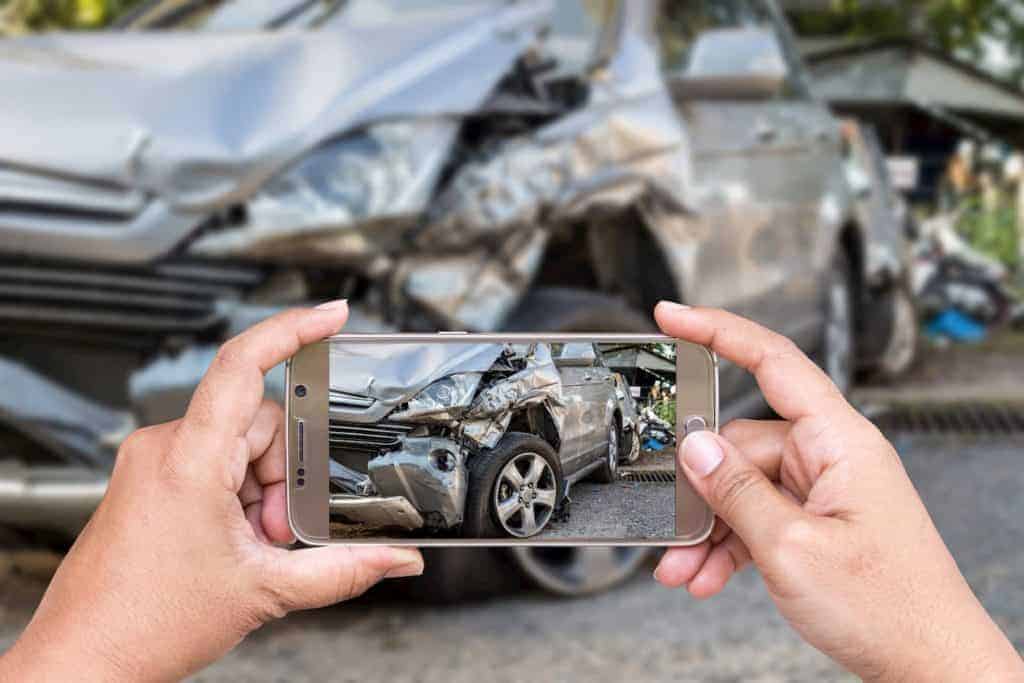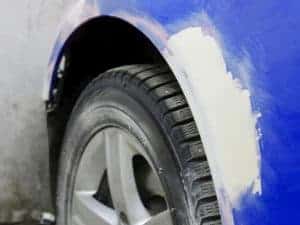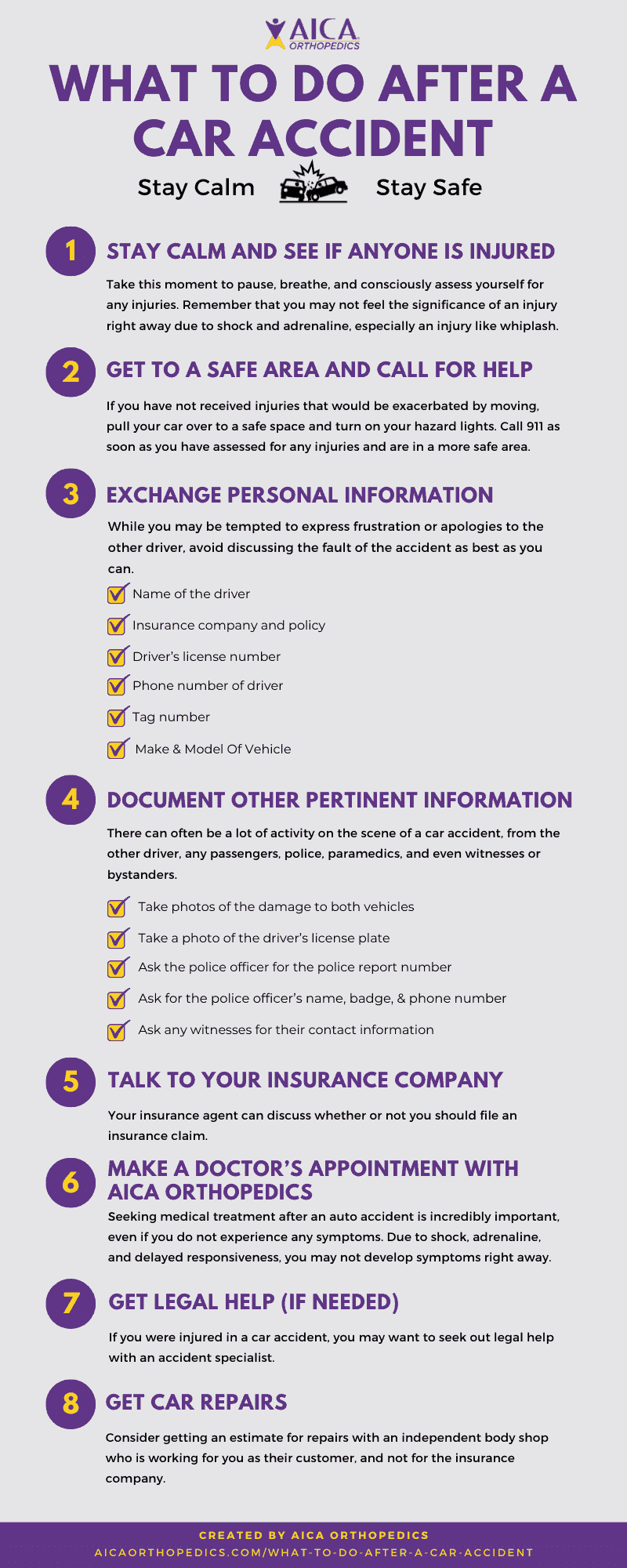When you’ve just endured a car accident, a million things are rushing through your mind. It can be overwhelming but figuring out your next steps will help.
At AICA Orthopedics, our team of doctors has the knowledge and the expertise to treat anyone who has been in a car accident, from those experiencing mild discomfort to those with more severe injuries. We also recognize that the responsibility of appropriate documentation of a car accident is key to a patient’s claims process.
Our highly skilled team of doctors will take care of you and all your medical concerns. The following steps are ten steps for what you should do after a car accident.
What to Do After a Car Accident
1. Stay Calm and See if Anyone Is Injured
The moment right after a car accident can be incredibly stressful—you may find yourself in shock, stunned, or feeling like everything is moving in slow motion. You may also find your adrenaline kicks in and want to get out of the car and assess the damage.
Take this moment to pause, breathe, and consciously assess yourself for any car accident injuries. Remember that you may not feel the significance of an injury right away due to shock and adrenaline, especially an injury like whiplash. Staying calm may sound impossible, but it can actually be the key to proceeding through the next steps successfully!
[ctaforBlog]
2. Get to a Safe Area and Call for Help
Take a look around to get your bearings to see whether you are in a safe location. If possible, pull your car over to a safe space and turn on your hazard lights. If you have sustained any injuries that may be exacerbated by movement, remember your health and safety come first.
Call 911 as soon as you have assessed for any injuries and are in a more safe area. Bystanders or the driver in the other vehicle may also call 911, but do not assume this. Also, you can still call 911 even if the driver of the other vehicle tries to pressure you into leaving the police out of it. Clearly communicate with the 911 operator about the state of yourself, the other driver to the best of your knowledge, and a description of where the accident took place.
Police at the scene will provide a record of the accident and can help provide context for a future claim. If paramedics also attend the scene, be sure to allow them to fully assess you and try to avoid saying “I’m fine.” Most car accident injuries take a while to present with symptoms, so allow medical professionals to thoroughly check you for any symptoms of whiplash, concussion, etc.
3. Exchange Car Personal Information
While you may be tempted to express frustration or apologies to the other driver, avoid discussing the fault of the accident as best as you can. Ask the other driver for their car insurance information and gather as much information as you can.
The following information is helpful to document:
Name of the driver
Insurance company and policy number
Driver’s license number
Phone number of driver
Tag number
Make, model, and color of vehicle
While some people who experience a car accident prefer to call their insurance company on the scene, it is important that you not speak with the other driver’s insurance company on the phone. Avoid saying “I’m sorry” or “It was my fault”. Allow police to assess the scene and develop their conclusions while you focus on gathering information.
4. Document Other Pertinent Information
There can often be a lot of activity on the scene of a car accident, from the other driver, any passengers, police, paramedics, and even witnesses or bystanders. Once you have exchanged insurance information with the other driver, here are some other things to document:
Take photos of the damage to both vehicles, even if you and the other driver(s) don’t agree on the level of damage
Take a photo of the driver’s license plate
Ask the police officer for the police report number and how to get a copy
Ask for the police officer’s name, badge number, and phone number
Ask any witnesses for their contact information, but do not pressure them to say anything to the police officer on your behalf
Jot down notes or take photos of any other potentially relevant information (location, etc.)
5. Collect and Save All Documentation
When it comes to documentation of an auto accident, proper documentation is incredibly important. Your insurance company, and potentially your lawyer if you decide to file a claim, will want to have as much information about the accident as possible.
For insurance and legal purposes, it is important to begin gathering medical documentation on any injuries sustained in an auto accident as soon as possible to understand the severity of injuries, necessary treatments, and support any claims for reimbursement of medical appointments and bills. AICA helps coordinate all of this documentation for our patients to ensure you receive the best settlement.
[ctaforBlog]
6. Talk to Your Insurance Company
In addition to providing your insurance company with the pertinent information above, you will also want to discuss the type of coverage you have, the coverage of the other driver, and how your insurance will cover you based on who determined at fault.
Your insurance agent can discuss whether or not you should file an insurance claim and what those steps would be. Additionally, you want to know about Georgia’s statute of limitations regarding the car accident and any injury claim with your insurance company.
Read More: How Do I Handle Insurance After a Car Accident?
7. Make a Doctor’s Appointment with AICA Orthopedics
If you’ve been in a car accident, schedule an appointment with AICA Orthopedics as soon as possible. Our auto accident clinic medical team at AICA Orthopedics works with car accident victims in and around Atlanta every day. We have the skills and expertise required to handle your situation with the care you deserve.
Seeking medical treatment after an auto accident is incredibly important, even if you do not experience any symptoms. Due to shock, adrenaline, and delayed responsiveness, you may not develop symptoms right away. Whiplash is an example of this, as it may take time for your body to properly communicate symptoms of pain or injury until later.
The rule of thumb with car accidents is that if your car has any damage, no matter how minor, then your body might, too. Seek medical treatment even if only to rule out any potential damage. You never know what underlying issues may develop, and our doctors have the advanced knowledge and technologies to provide you with an accurate diagnosis.
AICA Orthopedics has state-of-the-art diagnostic and imaging tools, like MRIs, X-rays, and CT scans, to help provide a comprehensive diagnosis of your injuries in one location with a team of car accident doctors ready to assist you.
AICA doctors develop individualized treatment plans for each patient based on their specific diagnosis, pain symptoms, and medical history. We simply don’t offer a one-size-fits-all approach to treating auto accident victims. We recognize every experience is different and everybody responds differently to injury and treatment.
The most important thing to consider after you’ve been in a car accident is your health and well-being. Our team at AICA is dedicated to ensuring quality care and recovery with our comprehensive, multi-specialty services all under one roof.
8. Get Legal Help if Necessary
If you were injured in a car accident, you may want to seek out legal help with an accident specialist. Accident specialists can help you determine whether or not you need an attorney.
Car accident victims who sustain significant injuries may want to pursue legal action to help reclaim any lost wages, compensation for medical treatments, and more. Auto injury lawyers know how to work with insurance companies. They will help you navigate the complicated claims and settlement process and help ensure you recover all types of damages you deserve based on your experience.
A car accident attorney can also help evaluate any settlement offers, help you comply with any state statutes of limitations when necessary, and handle all the complicated aspects of filing a successful lawsuit.
9. Be Sure You Understand Your Bills After an Accident
When it comes to understanding insurance, things can get confusing. That’s why our team at AICA is here to make it as easy as possible for you.
AICA Orthopedics accepts most forms of health insurance and specializes in third-party liability, which is an insurance policy that covers you if you were injured in a car accident and weren’t at fault. At AICA, we are dedicated to treating any and all injuries you may sustain in a car accident. We will work with you to submit the required paperwork to receive medical treatment reimbursements and other reparations.
10. Complete Necessary Car Repairs
After a car accident, your car is either repairable or totaled. If it is totaled, your car insurance company will give you an estimate of what your car is worth.
It is important to know that you can seek out a second opinion of the car’s value by finding comparable pricing for what it would cost to replace. Use resources like CARFAX for a report on the value of your car and how diminished claim values on your car. If there is a significant difference between the two totals, speak with your insurance company about the discrepancy to ensure you receive the amount you entitled to.
Repairing your car after an auto accident doesn’t have to be a stressful experience, though at first, it can seem overwhelming. We recommend you find an independent body shop that will assess your car and work with you to determine a fair value of services.
Often times, car insurance companies will insist you select from a list of preferred body shops, though these shops are often receiving payment in the form of a devaluation check with the insurance company.
Consider getting an estimate for repairs with an independent body shop who is working for you as their customer, and not for the insurance company, which helps you understand how much you can expect repairs to cost.
What to Do After a Car Accident Checklist
- See if anyone is injured
- Get to a safe area and call for help
- Exchange car insurance information
- Record other pertinent information
- Talk to your insurance company
- Make a doctor’s appointment with AICA orthopedics
- Get legal help if needed
- Make sure you understand your bills
- Complete necessary car repairs
Be sure to check out “what to do after a car accident” infographic.
What NOT To Do After a Car Accident Checklist
- Flee the scene
- Agree to a recorded conversation with their insurance company
- Say at the scene: I’m sorry, It was my fault, I’m not injured, or I’m okay
- Decline medical attention and care at the scene or after
- Misplace documentation for medical appointments and bills
What To Do After A Car Accident Frequent Asked Questions
At AICA Orthopedics, we don’t just want to answer your questions, we want to empower you with the knowledge to make the best decision and get the best care. Dealing with car accidents is our specialty and we’ve answered just about every question you can think of. However, if you don’t see your question below, be sure to contact us and ask! You can also find more at our Car Accident FAQ Section in our blog.
